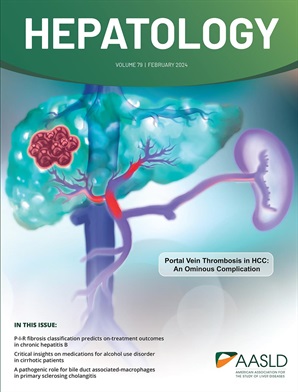LRP4突变促进复发性肝细胞癌的肿瘤进展和抗pd -1治疗的耐药性
IF 15.8
1区 医学
Q1 GASTROENTEROLOGY & HEPATOLOGY
引用次数: 0
摘要
背景和目的:肝细胞癌(HCC)复发是限制长期生存的主要因素,也是HCC患者死亡的主要原因。然而,复发性HCC的分子特征和潜在的治疗靶点仍然是未知的。方法和结果:我们对63个匹配的原发性和复发性HCC肿瘤进行了全外显子组测序(WES),并将数据与我们之前研究的43个配对样本的全基因组测序(WGS)结果相结合。Sanger测序用于鉴定203例复发性HCC患者的所有低密度脂蛋白受体相关蛋白4 (LRP4)编码外显子。我们在7.8%(24/309)的复发肿瘤中发现了LRP4体细胞突变,而在原发肿瘤中只有0.97% (3/309)(P<0.001)。LRP4突变的患者在第二次肝切除术后的预后较差。生物功能研究表明,使LRP4突变失活可促进肿瘤进展和免疫抑制。机制上,突变的LRP4通过激活β-catenin信号传导抑制CCL4的表达和分泌,从而减少肿瘤内常规1型树突状细胞和CD8+ T细胞的浸润,从而对抗程序性细胞死亡蛋白-1 (anti-programmed cell death protein-1, PD-1)治疗产生抗性。携带LRP4突变的复发性HCC患者在第二次切除手术后抗pd -1治疗没有获益。β-catenin抑制剂逆转了lrp4诱导的人源化荷瘤小鼠对抗pd -1治疗的抗性。结论:我们的研究结果确定了新的LRP4突变在复发性HCC中很重要。失活LRP4突变与抗pd -1治疗的耐药相关,可能是复发性HCC患者精确治疗的有用生物标志物。本文章由计算机程序翻译,如有差异,请以英文原文为准。
LRP4 mutations promote tumour progression and resistance to anti-PD-1 therapy in recurrent hepatocellular carcinoma
Background and aims: Hepatocellular carcinoma (HCC) recurrence is a major factor limiting long-time survival and the cause of most deaths in patients with HCC. However, molecular characterisation and potential therapeutic targets of recurrent HCC remain mostly unknown. Approach and results: We performed whole-exome sequencing (WES) in 63 matched primary and recurrent HCC tumours and combined the data with whole-genome sequencing (WGS) results in 43 paired samples from our previous study. Sanger sequencing was used to identify all low-density lipoprotein receptor-related protein 4 (LRP4 ) coding exons in 203 additional patients with recurrent HCC. We identified LRP4 somatic mutations in 7.8% (24/309) of recurrent tumours and only 0.97% (3/309) of primary tumours (P <0.001). Prognosis after the second liver resection was poorer in patients with an LRP4 mutation. Biofunctional investigations demonstrated that inactivating LRP4 mutations promoted tumour progression and immunosuppression. Mechanistically, mutated LRP4 reduced intratumoural conventional type 1 dendritic cell and CD8+ T cell infiltration by repressing CCL4 expression and secretion through activation of β-catenin signalling, resulting in resistance to anti-programmed cell death protein-1 (PD-1) therapy. Patients with recurrent HCC carrying an LRP4 mutation did not benefit from anti-PD-1 treatment after their second resection surgery. A β-catenin inhibitor reversed LRP4-induced resistance to anti-PD-1 therapy in humanised tumour-bearing mice. Conclusions: Our results identified novel LRP4 mutations important in recurrent HCC. Inactivating LRP4 mutations were associated with resistance to anti-PD-1 therapy and could be useful biomarkers for precision therapy in patients with recurrent HCC.
求助全文
通过发布文献求助,成功后即可免费获取论文全文。
去求助
来源期刊

Hepatology
医学-胃肠肝病学
CiteScore
27.50
自引率
3.70%
发文量
609
审稿时长
1 months
期刊介绍:
HEPATOLOGY is recognized as the leading publication in the field of liver disease. It features original, peer-reviewed articles covering various aspects of liver structure, function, and disease. The journal's distinguished Editorial Board carefully selects the best articles each month, focusing on topics including immunology, chronic hepatitis, viral hepatitis, cirrhosis, genetic and metabolic liver diseases, liver cancer, and drug metabolism.
 求助内容:
求助内容: 应助结果提醒方式:
应助结果提醒方式:


